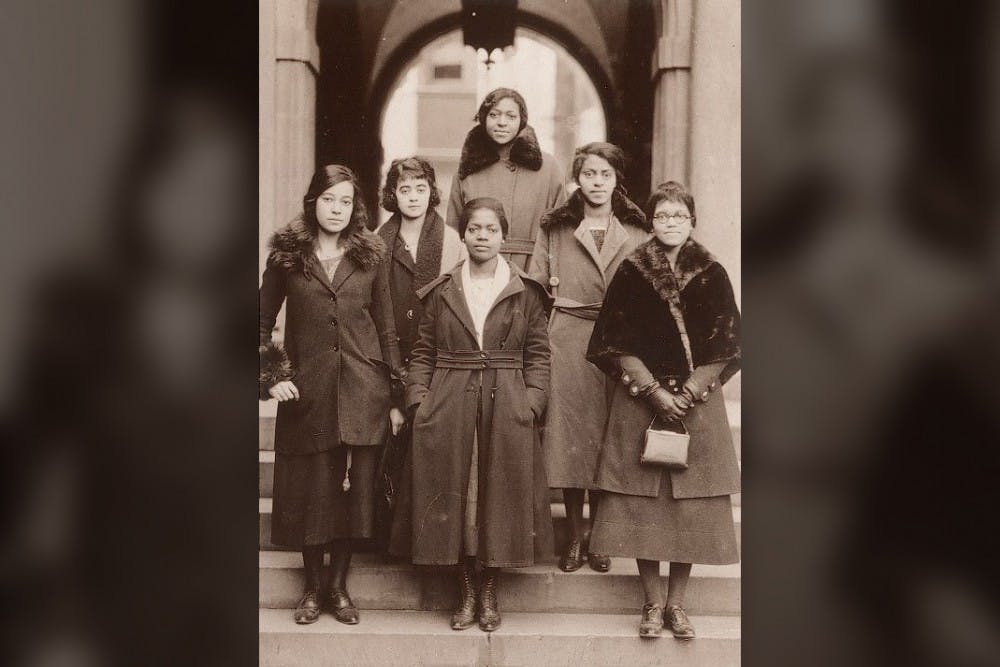Delta Sigma Theta, the University of Pennsylvania's first black Greek organization, celebrated the 100th anniversary of its Penn chapter over the past weekend, with over 100 current sisters and alumni in attendance.
On Saturday morning, members of the sorority filed in a procession down Locust Walk with the chapter’s banner.
They also engaged in a range of community service projects as well as hosted a TED Talk-style event where influential alumni came to talk about their work related to the sorority’s “Five-Point Programmatic Thrust”: educational development, economic development, international awareness and involvement, physical and mental health, and political awareness and involvement.
In honor of the centennial, the chapter’s service initiative also decided to sponsor a reading room for a local recreation center.
The sorority was founded on Jan. 13, 1913 by 22 college women at Howard University. In that year, Penn student Sadie Alexander was contacted to charter a chapter, but the University did not have enough black women attending, said College senior and DST President Maramawit Abera.
Abera said she was “deeply humbled” at the chance to celebrate the centennial.
In 1918, the Gamma chapter at Penn was finally chartered. The chapter had only five members at the time: Sadie Tanner Mossell Alexander, Virginia Margaret Alexander, Esther Butler King, Julia Mae Polk, and Pauline Alice Young.
Gamma was the third chapter of DST established. Aside from being the first DST chapter at an Ivy League institution, the Gamma chapter was also the first one to be founded at a predominantly white university.
RELATED:
Meet the two juniors working to reintroduce a historically black fraternity to Penn's campus
PAGE hosted the 'Unpacking Greek Life' event to discuss its pros and cons

Penn graduate Sadie T.M. Alexander in 1921. (Photo from University Archives and Records Center)
Alexander served as president of the Gamma chapter and was the sorority’s first national president. She was the first black woman to graduate from Penn College for Women, and graduated with honors in just three years.
Another notable alumna of DST is Vice Provost for University Life Valerie Swain-Cade McCoullum.
"Dr. Sadie T. M. Alexander was an extraordinary woman and a phenomenal role model," McCoullum wrote in an emailed statement to The Daily Pennsylvanian. "Those of us who have had the privilege and pleasure of following in her footsteps have done our very best to emulate her unwavering dedication to excellence, her exemplary service, and her resolute determination to knock doors down!”
Alexander was also the first black woman admitted to the Pennsylvania Bar in 1927. Anna Johnson Julian, the sorority’s fourth national president, became the first African American woman to earn a Ph.D. in sociology from Penn.
“Really recognizing the history and presence of Gamma has allowed me to witness just the profound importance of a black sorority,” Abera said. She noted that Gamma has “been a weapon” against racism, sexism, and social isolation.
“If you look at the list of the people that walked through the chapter, they don’t necessarily get the recognition that other University of Pennsylvania alum[ni] get on a regular basis,” Abera added.
Currently, DST has over 200,000 members at 1,000 collegiate and alumni chapters worldwide.
"It’s an honor to be able to say that I’m a part of that legacy and it really allows you to reflect on not only the rich history but also understand the true value of compassion, service, academic excellence, the black hunger for education, [and] the black hunger for absolute excellence just in the context of existing at a predominately white institution," Abera said.
DST has also always had an impact on Wharton junior and member of DST Victoria Brown.
“Growing up, my mom was really involved, and a lot of my mentors growing up were really involved,” Brown said.
For many sorors, membership lasts a lifetime.
Brown noted that this was a “really historic” moment for the University, the sorority, and the chapter. “[It’s] amazing to be a part of something larger,” she added.



